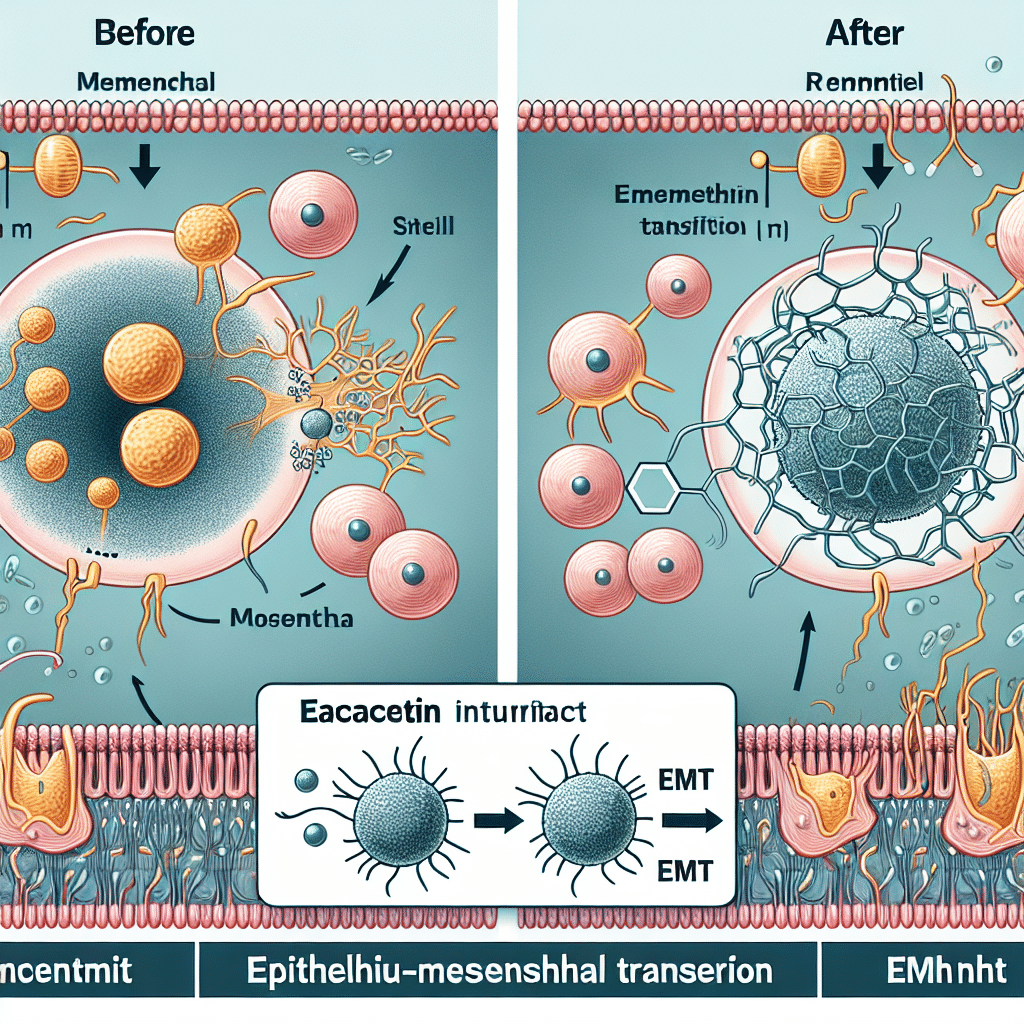Acacetin on EMT: What Research Shows
-
Table of Contents
- Acacetin and EMT: Unveiling the Research Insights
- The Basics of Acacetin
- Understanding EMT and Its Significance
- Research on Acacetin’s Effects on EMT
- Inhibitory Effects on Cancer Progression
- Molecular Mechanisms Involved
- Implications for Metastasis and Drug Resistance
- Case Studies and Clinical Trials
- Statistics and Research Outcomes
- Conclusion: Key Takeaways on Acacetin and EMT
- Discover ETchem’s Protein Products
Acacetin and EMT: Unveiling the Research Insights

Epithelial-Mesenchymal Transition (EMT) is a biological process that allows a polarized epithelial cell, which normally interacts with the basement membrane via its basal surface, to undergo multiple biochemical changes that enable it to assume a mesenchymal cell phenotype. This process is crucial in development, wound healing, and stem cell behavior, but it also contributes to the progression of diseases such as fibrosis and cancer metastasis. Acacetin, a naturally occurring flavonoid, has been the subject of research for its potential effects on EMT. This article delves into what research shows about the impact of acacetin on EMT.
The Basics of Acacetin
Acacetin is a flavone, a type of flavonoid, which is found in a variety of plants, including the damiana plant and the common honey plant. It has been studied for its various biological activities, including anti-inflammatory, anti-cancer, and anti-oxidant effects. The interest in acacetin has grown due to its potential therapeutic effects on various diseases.
Understanding EMT and Its Significance
EMT is a process that is not only essential for normal cellular activities but also plays a pivotal role in the progression of diseases. During EMT, epithelial cells lose their cell polarity and cell-cell adhesion, and gain migratory and invasive properties to become mesenchymal stem cells. This transition is a critical step in cancer metastasis, where cancer cells spread from the primary tumor to distant organs.
Research on Acacetin’s Effects on EMT
Recent studies have focused on the potential of acacetin to influence EMT, particularly in the context of cancer treatment. Here’s what the research shows:
Inhibitory Effects on Cancer Progression
Several studies have demonstrated that acacetin can inhibit EMT in various cancer cell lines. For example, research has shown that acacetin can suppress EMT in breast cancer cells by downregulating the expression of EMT markers such as N-cadherin and vimentin while upregulating E-cadherin, a cell adhesion molecule typically reduced during EMT.
Molecular Mechanisms Involved
The molecular mechanisms by which acacetin affects EMT are complex and involve multiple signaling pathways. Acacetin has been found to interfere with the TGF-β signaling pathway, which is known to induce EMT in cancer cells. Additionally, acacetin can modulate the activity of transcription factors such as Snail and Slug, which are key regulators of EMT.
Implications for Metastasis and Drug Resistance
By affecting EMT, acacetin has implications for cancer metastasis and drug resistance. Since EMT is associated with increased migratory and invasive capabilities of cancer cells, as well as resistance to chemotherapy, acacetin’s ability to inhibit EMT suggests it may help prevent metastasis and overcome drug resistance.
Case Studies and Clinical Trials
While much of the research on acacetin and EMT has been conducted in vitro or in animal models, there are emerging case studies and clinical trials that aim to translate these findings into clinical applications. These studies are crucial for determining the efficacy and safety of acacetin in humans.
Statistics and Research Outcomes
The current body of research, although still growing, provides promising statistics regarding acacetin’s potential as an anti-EMT agent. For instance, studies have shown significant reductions in EMT markers and metastatic behavior in treated cell lines and animal models.
Conclusion: Key Takeaways on Acacetin and EMT
In conclusion, research indicates that acacetin has a potential inhibitory effect on EMT, particularly in the context of cancer. By modulating key signaling pathways and transcription factors involved in EMT, acacetin may reduce metastasis and drug resistance in cancer cells. However, further clinical studies are needed to fully understand its therapeutic potential and safety profile.
Discover ETchem’s Protein Products
If you’re interested in exploring the benefits of proteins in health and research, ETchem’s protein products are worth considering. They offer a wide range of high-quality collagens and other protein supplements that cater to various industries, including nutraceuticals and pharmaceuticals.
About ETChem:
ETChem, a reputable Chinese Collagen factory manufacturer and supplier, is renowned for producing, stocking, exporting, and delivering the highest quality collagens. They include marine collagen, fish collagen, bovine collagen, chicken collagen, type I collagen, type II collagen and type III collagen etc. Their offerings, characterized by a neutral taste, instant solubility attributes, cater to a diverse range of industries. They serve nutraceutical, pharmaceutical, cosmeceutical, veterinary, as well as food and beverage finished product distributors, traders, and manufacturers across Europe, USA, Canada, Australia, Thailand, Japan, Korea, Brazil, and Chile, among others.
ETChem specialization includes exporting and delivering tailor-made collagen powder and finished collagen nutritional supplements. Their extensive product range covers sectors like Food and Beverage, Sports Nutrition, Weight Management, Dietary Supplements, Health and Wellness Products, ensuring comprehensive solutions to meet all your protein needs.
As a trusted company by leading global food and beverage brands and Fortune 500 companies, ETChem reinforces China’s reputation in the global arena. For more information or to sample their products, please contact them and email karen(at)et-chem.com today.




